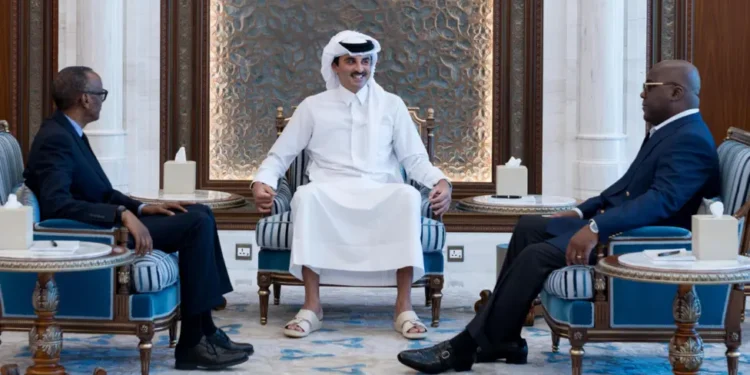The Democratic Republic of Congo’s President Félix Tshisekedi and Rwanda’s President Paul Kagame have jointly called for an “immediate ceasefire” in eastern DR Congo. The call followed direct talks between the two leaders in Qatar, marking the first time they have met since M23 rebels escalated their offensive in the region.
The conflict has devastated eastern DR Congo, with authorities reporting that at least 7,000 people have been killed since January. However, it remains unclear whether the M23 rebels will heed the ceasefire call, as they refused to participate in peace talks in Angola just days earlier.
Rwanda’s Alleged Role in the Conflict
DR Congo has long accused Rwanda of arming M23 and even deploying troops to support the rebel group, allegations that both the UN and the US have backed. Rwanda, however, denies these claims, insisting that its forces are acting in self-defence against attacks from the DR Congo army and allied militias.
DR Congo has also accused Rwanda of illegally exploiting its mineral resources in the eastern part of the country, another claim Rwanda denies.
Despite these denials, most mainstream media have persisted in accusing Rwanda of backing the rebels, without concrete evidence.
Ceasefire: A First Step
The Qatari Foreign Ministry released a joint statement confirming the leaders’ commitment to an “immediate and unconditional” ceasefire. However, it did not provide details on how it would be enforced or monitored.
“The heads of state then agreed on the need to continue the discussions initiated in Doha in order to establish solid foundations for lasting peace,” the statement added.
Despite the diplomatic gesture, scepticism remains over whether peace efforts will gain traction. Just last December, peace talks brokered by Angola collapsed when Rwanda insisted that DR Congo negotiate directly with M23—a demand Kinshasa rejected.
Rebels Gain Ground
Since the breakdown of peace talks, M23 rebels have made significant territorial gains, capturing key cities such as Goma and Bukavu in recent months. The rebel group’s decision to withdraw from the Angola negotiations on Monday followed the European Union’s announcement of sanctions against its leadership.
The timing of the Doha meeting caught many by surprise, given the strained relations between Tshisekedi and Kagame. The two leaders have frequently exchanged harsh words in public, making their willingness to meet in person a significant diplomatic shift.
A “Strategic Ally” Steps In
Rwandan officials emphasised that external negotiations between DR Congo and M23 were essential for addressing the “root causes of the conflict.” President Kagame expressed optimism, stating that with “all parties working together, things can move forward faster.”
Meanwhile, DR Congo’s presidential spokeswoman Tina Salama credited Qatar’s Emir, Sheikh Tamim bin Hamad Al Thani, with initiating the talks, calling Qatar a “strategic ally” of both nations. The Congolese government described the meeting as a first step toward establishing lasting peace in the volatile region, hinting at further negotiations in the future.



